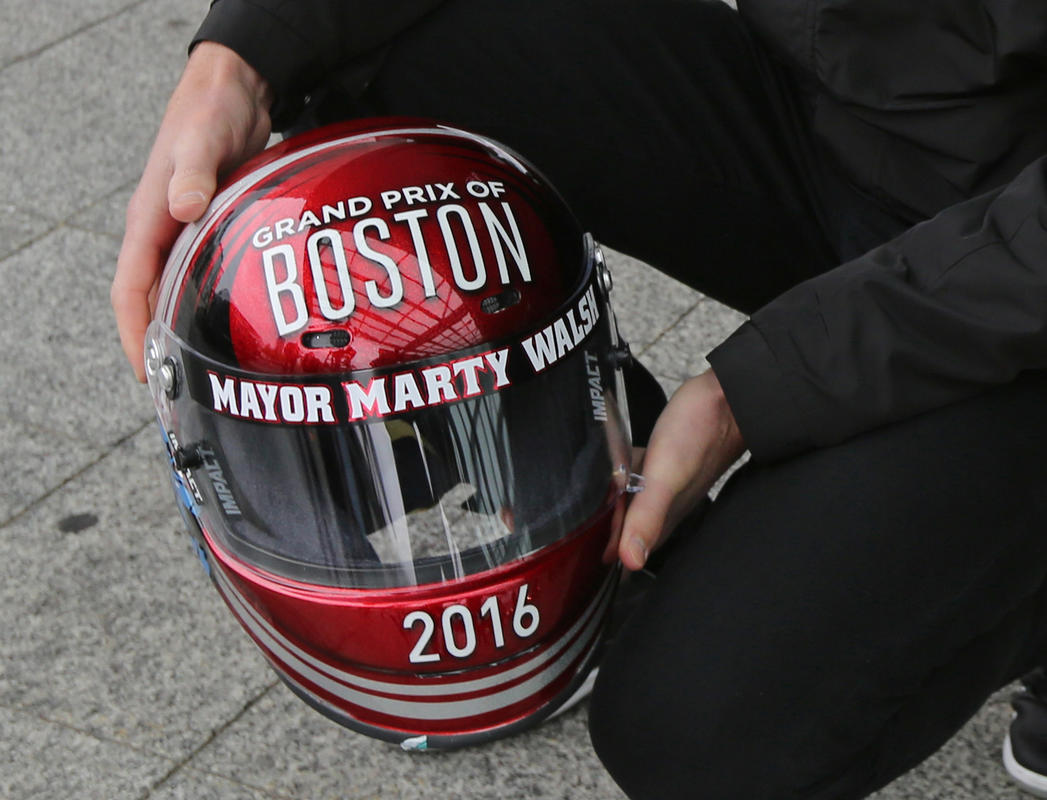Organizers confident they can overcome Boston politics
 |
| Boston GP helmet waiting for the Mayor |
Announced this past May and re-confirmed last week, the inaugural Grand Prix of Boston is scheduled for September 2-4 2016, Labor Day Weekend.
As a major East Coast Market, Boston has obvious appeal for the series. Throw in a racy 2.5-mile layout amidst the picturesque South Boston Waterfront backdrop, and a host of local sponsors already signed on to support the event, it would appear on the surface at least, Boston has the potential to be a long-term success for the IndyCar Series.
Without rehashing years of depressing carnage, longtime followers of the IndyCar Series know it's never exactly easy to break ground with new events, particularly urban street circuits. With respect to Boston specifically, there are local issues such as the city's failed bid for the 2024 Summer Olympics and other details that have raised concerns over the race. These concerns have come to the surface in recent weeks through a variety of reports articulating the concerns of residents over financing and disruption to the city along with some of the bureaucratic hurdles facing the organizing group Grand Prix of Boston.
Seeking the perspective of race organizers regarding some of the concerns surrounding the event, AutoRacing1 spoke with Jana Watt, a spokeswoman with Grand Prix of Boston.
Specifically, at issue in Boston appear to be three factors:
- Questions over the use of public money for the event and possible disruption in the city, which has created public opposition
- The availability of certain parts of the city necessary for the event and somewhat related to this point…
- The cooperation of multiple local state and city agencies to make the event go
[adinserter name="GOOGLE AD"]Before moving ahead it should be noted that the intent of this piece is not to forward one agenda or another, nor to speculate as to what may or may not become of the Grand Prix. The goal here is to offer something AutoRacing1 believes has been lacking in the coverage of the event: the perspective of event organizers, regarding the question marks surrounding the event.
To begin, Watt admits there is "a lot to be resolved," although she also says that this is somewhat standard for such events which require the approval of multiple entities. As for the biggest issue (point 1 above) Watts reiterates something organizers have claimed all along with regard to the race: "No municipal money will be used. All the funding for the race will come from the Grand Prix or corporate sponsors."
Now, Watt did say that her company is "working with the city" over improvements for the race, and in particular seeing, if there are monies "earmarked for improvements" already in the city budget. For example, if the city has budgeted money to improve a road in 2017, through their conversations with city and state officials Grand Prix of Boston is seeing if the city might "move up payments" a year or two.
Of course, Grand Prix of Boston is not simply dealing with the City of Boston, but also various agencies in the state of Massachusetts. Keep in mind, there are some parts of the course, in fall under the jurisdiction of the City of Boston and others which fall under the state. A parallel IndyCar fans are perhaps familiar with would be the Grand Prix of Baltimore, which actually took place under three jurisdictions with the city, county state and there agencies all involved.
Watts admits this is somewhat challenging and that there are "a lot of moving parts," with a total of five agencies, which need to sign off on various deals.
One of those agencies is Massachusetts Convention Center Authority, which runs the city's convention center. I asked Watt specifically about the use of the convention center and a quote from MCCA acting head Fred Peterson in the October 21st edition of the Boston Herald, in which Peterson is quoted as saying his group is "not anywhere close" to signing off on the race.
 |
| Boston circuit |
Watt again stated that "no public money" would be used and that "we remain in regular conversation with the convention center, and are working on terms of the arrangement," said Watt.
Also, of interest was Watt's response when I asked about Monday's article in the Boston Herald the title of which claimed the city had offered organizers an ultimatum. Part of the letter read that the Mayor Martin J. Walsh "is increasingly concerned with the progress (or lack thereof) of those discussions" with the various agencies/ Walsh's desire to have these agreements concluded in two weeks is also stated in the letter.
"I wouldn't call it an ultimatum. We need all these agreements in place…we want to move forward." Watt also pointed to the letter's conciliatory tone in which the mayor's office thanked GP of Boston for their efforts in making the event go ahead.
"We are interested in helping to coordinate technical city expertise in an effort to further detail the actions and assurances necessary to acquire the City permits for use of Boston's city services, roads and infrastructure for your proposed event," read part of the letter.
Overall, Watt's tone tended to be that of business-as-usual.
"The response has been great from our partners. Date equity is important to us, and we're thrilled with the Labor Day date. Historically, that is college move-in time, which represents a powerful weekend for our partners."
The takeaway from my conversation Walsh is that while there are hurdles in place to the Grand Prix going off, they are not in the minds of the organizing group at least, possible deal-breakers.
As for whether that is a good thing or a bad thing, time will tell.
Brian Carroccio is a senior columnist for AutoRacing1. He can be contacted at BrianC@AutoRacing1.com
[adinserter name="GOOGLE AD"]
